De Amerikaanse schrijver David Sedaris werd geboren in Binghamton, New York, op 26 december 1956. Zie ook alle tags voor David Sedaris op dit blog.
Uit: Holidays on Ice
“During the second interview we were asked when we wanted to be elves. This is always a problem question. I listened as the woman ahead of me, a former waitress, answered the question, saying, “I really want to be an elf? Because I think it’s about acting? And before this I worked in a restaurant? Which was run by this rally wonderful woman who had a dream to open a restaurant? And it made me realize that it’s really really … important to have a … dream?”
Everything this woman said, every phrase and sentence, was punctuated with a question mark and the interviewer never raised an eyebrow.
When it was my turn I explained that I wanted to be an elf because it was one of the most frightening career opportunities I had ever come across. The interviewer raised her face from my application and said, “And …?”
I’m certain that I failed my drug test. My urine had roaches and stem floating in it, but still they hired me because I am short, five feet five inches. Almost everyone they hired is short. One is a dwarf. After the second interview I was brought to the manager’s office, where I was shown a floor plan. On a busy day twenty-two thousand people come to visit Santa, and I was told that it is an elf’s not to remain merry in the face of torment and adversity. I promised to keep that in mind.
I spent my eight-hour day with fifty elves and one perky, well-meaning instructor in an enormous Macy’s classroom, the walls of which were lined with NCR 2152’s. A 2152, I have come to understand, is a cash register. The class was broken up into study groups and given assignments. My group included several returning elves and a few experienced cashiers who tried helping me by saying things like, “Don’t you even know your personal ID code? Jesus, I had mine memorized by ten o’clock.”
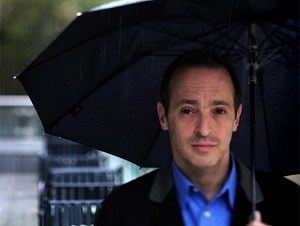
David Sedaris (Binghamton, 26 december 1956)
De Amerikaanse schrijfster Elizabeth Kostova werd geboren op 26 december 1964 in New London, Connecticut. Zie ook alle tags voor Elizabeth Kostova op dit blog.
Uit: The Swan Thieves
“The woman shields her bundle with her arms, with her gloved hands, turning her back on the center of the village as quickly as possible. Her boots click on a patch of ice in the road. Her breath shows pale against the gathering dark. She draws herself together, close, protective, hurrying. Is she leaving the village or hastening toward one of the houses in the last row?
Even the one person watching doesn’t know the answer, nor does he care. He has worked most of the afternoon, stroking in the walls of the lanes, positioning the stark trees, measuring the road, waiting for the ten minutes of winter sunset. The woman is an intruder, but he puts her in, too, quickly, noting the details of her clothes, using the failing daylight to brush in the silhouette of her hood, the way she bends forward to stay warm or to hide her bundle. A beautiful surprise, whoever she is. She is the missing note, the movement he needed to fill that central stretch of road with its dirt-pocked snow. He has long since retreated, working now just inside his window — he is old and his limbs ache if he paints out of doors in the cold for more than a quarter of an hour — so he can only imagine her quick breath, her step on the road, the crunch of snow under her sharp boot heel. He is aging, ill, but for a moment he wishes she would turn and look straight at him. He pictures her hair as dark and soft, her lips vermilion, her eyes large and wary.
But she does not turn, and he finds he is glad. He needs her as she is, needs her moving away from him into the snowy tunnel of his canvas, needs the straight form of her back and heavy skirts with their elegant border, her arm cradling the wrapped object. She is a real woman and she is in a hurry, but now she is also fixed forever. Now she is frozen in her haste. She is a real woman and now she is a painting.”
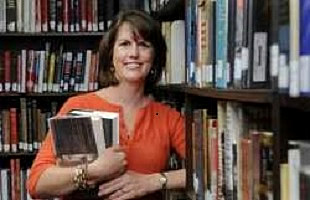
Elizabeth Kostova (New London, 26 december 1964)
De Amerikaanse schrijver Henry Miller werd geboren op 26 december 1891 In New York. Zie ook alle tags voor Henry Miller op dit blog.
Uit: Tropic Of Capricorn
“I was corrupt, in other words, corrupt from the start. It’s as though my mother fed me a poison, and though I was weaned young the poison never left my system. Even when she weaned me it seemed that I was completely indifferent; most children rebel, or make a pretence of rebelling, but I didn’t give a damn. I was a philosopher when still in swaddling clothes. I was against life, on principle. What principle? The principle of futility. Everybody around me was struggling. I myself never made an effort. If I appeared to be making an effort it was only to please someone else; at bottom I didn’t give a rap. And if you can tell me why this should have been so I will deny it, because I was born with a cussed streak in me and nothing can eliminate it. I heard later, when I had grown up, that they had a hell of a time bringing me out of the womb. I can understand that perfectly. Why budge? Why come out of a nice warm place, a cosy retreat in which everything is offered you gratis? The earliest remembrance I have is of the cold, the snow and ice in the gutter, the frost on the window panes, the chill of the sweaty green walls in the kitchen. Why do people live in outlandish climates in the temperate zones, as they are miscalled? Because people are naturally idiots, naturally sluggards, naturally cowards. Until I was about ten years old I never realized that there were “warm” countries, places where you didn’t have to sweat for a living, nor shiver and pretend that it was tonic and exhilarating. Wherever there is cold there are people who work themselves to the bone and when they produce young they preach to the young the gospel of work – which is nothing, at bottom, but the doctrine of inertia. My people were entirely Nordic, which is to say idiots. Every wrong idea which has ever been expounded was theirs. Among them was the doctrine of cleanliness, to say nothing of righteousness. They were painfully clean. But inwardly they stank. Never once had they opened the door which leads to the soul; never once did they dream of taking a blind leap into the dark. After dinner the dishes were promptly washed and put in the closet; after the paper was read it was neatly folded and laid away on a shelf; after the clothes were washed they were ironed and folded and then tucked away in the drawers. Everything was for tomorrow, but tomorrow never came. The present was only a bridge and on this bridge they are still groaning, as the world groans, and not one idiot ever thinks of blowing up the bridge.”
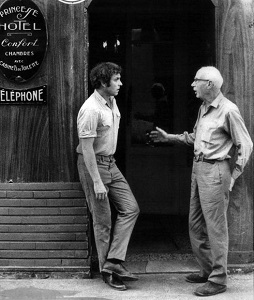
Henry Miller (26 december 1891 – 7 juni 1980)
Hier met de acteur Rip Torn (links) bij de verfilming van Tropic Of Cancer
De Duitse dichter Rainer Malkowski werd geboren op 26 december 1939 in Berlijn-Tempelhof. Zie ook alle tags voor Rainer Malkowski op dit blog.
AUF DEM NACHHAUSEWEG
Eisige Nacht.
Aber der Mann auf dem Gehsteig,
den Kopf im Nacken,
rührt sich nicht.
Sein Blick steckt fest
in einer Sternverwehung.
Wink von oben
Dank für Ihre Post.
Aber gerade als ich im Garten
Ihr Gedicht lesen wollte,
schob sich eine finstere
Wolke vor die Sonne.
Glauben Sie an Fügungen?
Wenn Sie wollen,
schicken Sie mir ein anderes Gedicht.
Für dieses hier
bin ich als Leser verdorben.
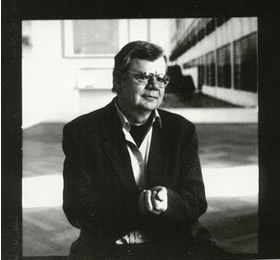
Rainer Malkowski (26 december 1939 – 1 september 2003)
De Duitse schrijver Mani Beckmann (pseudoniem Tom Finnek) werd geboren op 26 december 1965 in Alstätte/Westfalen. Zie ook alle tags voor Mani Beckmann op dit blog.
Uit: Moorteufel
„Aber nie fragten sie nach, wenn ich wortlos meinen Wanderstab ergriff und den Filzhut aufsetzte. Sollte ich jedoch meine Pflichten auf dem Hof vernachlässigen, so würde dies unweigerlich Ärger heraufbeschwören.
»Sie kommt nicht mehr«, murmelte ich und wischte mir die Nässe aus dem Gesicht. Ich schlotterte mittlerweile am ganzen Körper, mir war elend zumute, und eine Art Fieber hatte mich ergriffen. Ich spürte den Regen nicht mehr, auch die Kälte nicht. Und immer wieder murmelte ich: »Sie kommt nicht.«
Schweren Herzens machte ich mich schließlich auf den Heimweg, stiefelte mühsam durch die Heide in Richtung Ahlbeck und erkannte kaum den Boden zu meinen Füßen. Der Weg war lediglich ein Trampelpfad von wenigen Ellen Breite, hier und da von Erikagestrüpp und Heidekraut überwuchert und von Baumwurzeln der umstehenden Kiefern durchzogen, über die ich immer wieder stolperte. Es war inzwischen stockfinster, und es fiel mir schwer, mich zu orientieren.
Ich dachte an die Zeit zurück, als Lotte und ich uns kennengelernt hatten. Zu Beginn des Jahres hatte ich meine Mutter mit dem Einspänner zu dem etwa eine Meile entfernten Nachbarort Oldendorf chauffiert. Sie hatte von der Frau des Amtmannes Boomkamp den Auftrag erhalten, für deren Tochter ein edles Abendkleid zu nähen. Vor ihrer Heirat und bevor es sie ins Münsterland verschlagen hatte, war meine Mutter eine talentierte Schneiderin aus dem Hannoverschen gewesen, und sie nahm auch heute von Zeit zu Zeit noch Aufträge an, um zusätzliches Geld in die Haushaltskasse zu bekommen. Während meine Mutter bei dem »Fräulein Lieselotte« – wie sie uns vorgestellt worden war – Maß nahm, starrte ich die Amtmannstochter wie ein Wesen aus einer fremden Welt an.“
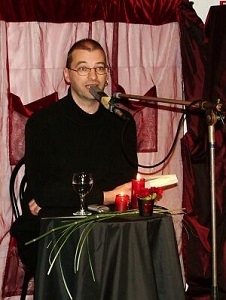
Mani Beckmann (Alstätte, 26 december 1965)
De Cubaanse schrijver, essayist en musicoloog Alejo Carpentier werd geboren in Havana op 26 december 1904. Zie ook alle tags voor Alejo Carpentier op dit blog.
Uit: The Lost Steps (Vertaald door Harriet de Onís)
“In the quarter where the sun should have appeared, the sky was covered by a strange reddish cloud, like smoke, like hot ashes, like a dark pollen that had arisen swiftly, stretching from one horizon to the other. When the cloud moved overhead, it began to rain butterflies on the roofs, the water jars, our shoulders. They were little butterflies, deep amaranth in color, striped in violet, which had come together by myriads in some unknown spot behind the immense jungle, frightened, perhaps, driven away, after multiplying frenziedly, by some cataclysm, some awful occurrence, without witnesses or record. The Adelantado told me that these swarms of butterflies were nothing new in the region, and that when they took place the sun was almost blotted out for the whole day. The burial of the father would have to be carried out by candlelight in a day that was night, reddened by wings.”
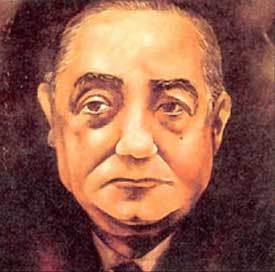
Alejo Carpentier (26 december 1904 – 24 april 1980)
Zie voor nog meer schrijvers van de 26e december ook mijn vorige twee blogs van vandaag.
